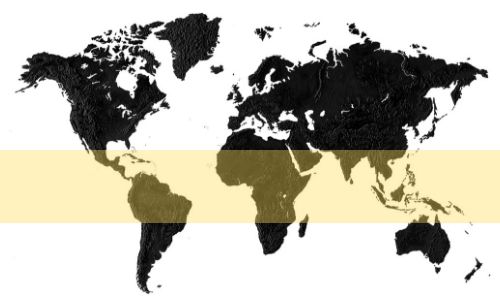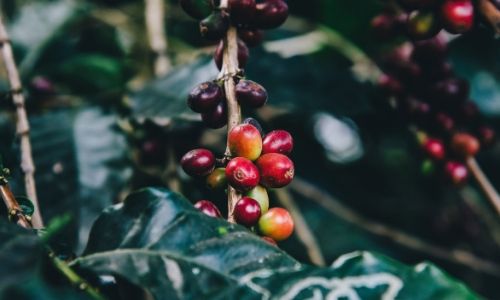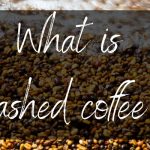Whenever you're buying coffee you're bound to find a "100% Arabica" label somewhere. Or some new coffee shop will brag about only serving Arabica coffee.
But what is Arabica coffee, and why is everyone so in love with it ?
Don't worry, I never knew there were different types of coffee until my final years of college. All I knew was that I liked or disliked this or that coffee, without really knowing why.

Table of Contents
So what is Arabica coffee, and where does it come from ?
Arabica coffee is the first coffee, ever. It's the coffee bean that sprouted and developed into the most human-friendly version, and it originates from Ethiopia (African continent), dating back several centuries.
You see, coffee is actually two very different types of coffee: Arabica, and Robusta.
Arabica is the most sought after type, and is has dozens of sub-types. Arabica coffee is the one with more flavor, nuances, less acidity, and less bitterness.
It's a very mellow and mild coffee. It's also got only half the caffeine of Robusta beans, but double the amount of natural sugars and fats, which help develop those flavors Arabica is famous for.
So now you know what Arabica is. It's one of the two kinds of coffee out there, and now every time you see "contents: Arabica coffee" it won;t be as mysterious or as impressive.
For a few years I was actually kind of frustrated no coffee company ever bothered to explain just what Arabica is. I occasionally found a Robusta/Arabica mix, and was even more confused.
Turns out Arabica coffee is so common it doesn't need an explanation anymore.
How Arabica coffee became so popular
Back when coffee wasn't a thing, the first people ever to drink it were those of Ethiopia. The exact stories and accounts of how they figured out coffee are many, varied, and sometimes bring Yemen into the whole thing.
Well, for the purpose of this article the exact legend doesn't matter, what's important is that coffee was brought from Ethiopia into neighboring Yemen, in the end.
Yemen was a very important trading country, with an even more important trading port city - Mocha. It may or may not have to do with the modern coffee drink named Mocha.
Yemen is part of the Arabian Peninsula, and over the centuries has been part of the Ottoman Empire given how vastly it extended back in the day.
It's actually how Arabica coffee got its name. It was associated with Arab culture, trade, and became a sort of staple that was internationally recognized.
For a very long time it was basically the only coffee we knew of. So it happened that Arabica became popular enough to be cultivated pretty much everywhere, but most importantly in Asia.
For a few centuries this was okay, until the Coffee Leaf Rust came about. It was (still is, there's no way to get rid of it) a parasite that 'ate' the coffee tree, and thus ruined crops across several countries, starting with Sri Lanka, Indonesia and Vietnam.
The big problem was that Arabica crops were and still are highly sensitive to any pests and diseases, which meant that they were decimated when CLR came about.
This resulted in two things.
First, Arabica was replaced with Robusta, which is a much hardier coffee plant and is now almost half the the global coffee production. It's got naturally higher caffeine levels (nearly double) than Arabica, which means is will survive and actually repel most diseases and pests.
Aside from that Robusta coffee can live in poorer conditions than Arabica, meaning it's easier to grow on lower elevations. Hence the name Robusta, as in robust, hardy.
Second thing that happened, Arabica became kind of precious. Given how much more flavorful it is, and how much milder in taste than Robusta, Arabica became very sought after.
The whole CLR incident only made it more important. This effect was compounded in time by general demand and the efforts needed to grow a crop, and now Arabica is regarded as a sort of premium item.
Where does Arabica coffee grow ?
You read that Arabica comes (originally) from Ethiopia. But that's in Africa. So does that mean Arabica comes from Africa ?
Today yes, some Arabica comes from Africa. But really, all coffee grows in the Coffee Belt region - that's simply a wide band across the globe that contains the Equator, and 30 degrees North and South of the Equator.
It's the area most suited to growing coffee, and especially Arabica, because of volcanic activity, good soil, humidity, sunshine, and elevation.
It means you'll find Arabica from Central Africa, most of Asia, Central and South America, a tiny bit of North Australia, and everything in between that I may have missed. A clearer map is shown below.
Aside from the actual region/countries where Arabica coffee grows, you also need to know the type of terrain it usually occupies. Why ?
Because it can and does influence the price of you cup of coffee.
Look, coffee (but especially Arabica) needs elevated ground to grow on, it's a must in the industry. This means you're going to find coffee farms pretty much on the side of a mountain, or at least on very nigh, sloping hills.
Just how high the altitude needs to be depends on how far the region is from the Equator. In short, the closer to the hot zone, the lower the necessary elevation.
There is also the fact that Arabica needs to grow not just on elevated ground, but at an angle. This is so the excess rainwater will run off and not pool at the plant's base.
An overly watery coffee plant will produce muddy, odd tasting beans. Arabica is a mild coffee anyway, watering it down will make it even milder and will muddle the flavor.
The high elevation and steep angles will mean getting to the coffee beans is bit more difficult, and they are often hand picked. As with any manual labor, this raises the final price of coffee.
All in all, successfully growing a crop of Arabica from sprout to harvest is kind of painstaking, which will reflect on he price you pay for that coffee.
Is Arabica coffee the best ?
I wouldn't say Arabica coffee is necessarily the best. Robusta has its uses, and drinking pure Arabica has proved for me to be a disappointing experience.
There is simply less body, oomph, and general caffeine in Arabica, which for me made it a very poor option. I mean the 100% pure Arabicas.
Arabica is a wonderful coffee to drink black, whether you have a drip-filter or drink it as a black espresso.
From that point of view it's much milder and easier to handle without any sugar or milk to speak of.
But I've found that mixing Arabica with Robusta is a good potion for me, and in truth it might be the best potion for many people.
You see, Robusta on its own is terrible. Too bitter, harsh, and just needs a lot of milk and sugar to be drinkable. But use it in combination with Arabica, and it just gives the mix more of a body and strength than pure Arabica can ever get on its own.
Some might say that pure Arabica is the best, and only way to drink any coffee, ever. I think those people are exaggerating, and there is really a lot to be said for a proper mix between Arabica and Robusta.
What "100% Arabica" means and why you pay extra
So what's the deal with 100% pure Arabica, and why does it matter ?
In short, it's coffee that has nothing but Arabica. It could be from just one farm/estate or it could be from several farms, as long as it's all the exact same sub-type of Arabica.
Pure Arabica ahs become a sought after item, mostly for flavor. Arabica is the most capable bean of the two when it comes to developing new flavors, or perfecting a specific one.
Naturally, the process takes time and skill, which raises the price of the coffee. It also comes along with the general trouble of growing Arabica beans, which is fairly expensive on its own.
So, you're basically paying extra for a 'pure' product. Maybe it matters for you, maybe it doesn't.
More exclusive than pure Arabica is single origin coffee. This means your coffee comes from just one estate, and thus is a completely uniform coffee flavor.
There are no slight differences from one part of the country to another, since you're getting coffee from the exact same crop. You're getting the full flavor of those beans, and this means they are produced in smaller batches.
This creates scarcity, and so a higher price.
And so, a good Arabica is both 100% pure and single origin, if you're looking for a very flavorful cup of coffee.
Is Arabica better than Robusta ?
You might wonder, after all this, if Arabica ends up being better than Robusta. Well, yes, it does in a way.
I think there should always be a bit of Robusta in any coffee blend, for those who drink coffee for the kick and the general love of coffee, rather than flavor.
Robusta will balance out the mildness and supreme flavor of Arabica with some more body and caffeine, to suit the general public.
But for intense, die-hard coffee lovers ? Arabica is pretty much the best for them, and definitely better than Robusta.
The amount of flavor and nuances available in Arabica is unparalleled by Robusta, and this is highly valued by most coffee lovers.
So in short, the answer is that yes, Arabica is better than Robusta in terms of flavor. But Robusta cannot be swept aside, and is actually useful.
What is Arabica coffee used for ?
So now that you know what Arabica coffee is, how it needs a bit of Robusta, and in general how it grows, let's talk about where Arabica is used.
Like for which drinks and how specific.
You might think it's in pretty much every cup of coffee, and you'd be right. But there are some drinks where Arabica is the way to go, and others where you'll need mostly Arabica to get a good coffee.
The first example is espresso. Pure Arabica espresso is possible, but produces a small amount of crema. For lattes and cappuccinos, this is unacceptable and you'll need to add just a bit of Robusta to the mix.
So if you're making a black espresso, you're fine with using just Arabica.
If you're also making any sort of black coffee, like filter or Moka or French press, then pure Arabica will again be a good option as it's much milder than Robusta and will taste better.
But, if you plan on adding any sort of milk or sugar to your coffee, you'll be disappointed by pure Arabica. The taste will be overwhelmed by the milk, and you'll be left with a watered down version of whatever coffee you're making.
The best brewing methods for Arabica coffee
If you're looking for a great way to brew Arabica, you'll need a method that focuses on slowly bringing out the flavor and notes of your coffee.
This means that you need a longer extraction period, and a method where you can control pretty much any element of the brewing process.
The first, and most easily available method is to use a French press. This method brings out the best of what your coffee has to offer, and as such is regarded as pretty much the best coffee brewing method, ever.
A good French press like this one will allow you to decide on the temperature of the water you use, how long to let the coffee steep, and it will also keep the ground coffee away from the actual brew.
This French press by KONA is a larger one, so if you're brewing for a crowd you can get 2-3 full cups of coffee here. Or more, de[ending on how large your cups are.
You can check the listing on Amazon here, and read the reviews as well.
If you'd like a brewing method that allows you to have ice-cold coffee that won't get diluted by ice cubes (won't need any to begin with), then you're looking for cold brew.
A cold brew will bring out even more depth of flavor than a French press, but it will take infinitely more to brew (think 18 hours). You're really just brewing coarse ground coffee in cold water, and have to leave it overnight in order to get the full aroma.
What you do get with a cold brew is different from a French press, in that the coffee taste is more subtle, but the notes in the coffee are more pronounced.
The latest cold brew I had tasted a lot like caramel, though the only thing in it was a little bit of sugar and almond milk. The coffee taste was there, but not harsh enough to overpower the caramel notes.
A good way to cold brew coffee is to use a dedicated, big jar with a filter in it, like this one from Country Line Kitchen.
It can hold a large amount of cold brewed coffee (2 quart), and the metal filter is easy to remove and clean. Dishwasher safe, and will not spill over when deposited in the fridge.
You can check the listing on Amazon here, and read the reviews as well.
Whichever brewing method you decide to use, you can be sure your Arabica will benefit from it.
Using other brewing method with a high water temperature will kind of burn the flavors of the Arabica, and it's a pity if you've got a particularly good one.
And using something like an espresso machine will not give the water enough time to properly extract all the flavor from the Arabica, which is again a pity. Best to use a slower method.
Final thoughts
Arabica coffee beans are pretty much the way to go if you want a very flavorful, but mild cup of coffee.
Most of the time it will do very well as black coffee. If you do decide to add any milk and sugar, know that you should add a small amount since you can overpower the coffee taste.
If you want to know more about coffee or tea, feel free to check the related articles below. Who knows what else you might find ?








